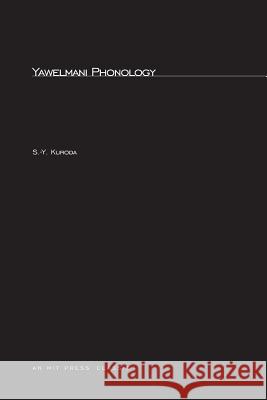Yawelmani Phonology » książka
Yawelmani Phonology
ISBN-13: 9780262611923 / Angielski / Miękka / 2003 / 88 str.
Generative phonology, a comparatively recent development on the linguistic front, has stimulated a reconsideration of the conceptual scheme of phonology in general in the past ten years. The ground gained is certainly evident in the present study, a technical reorganization according to generative phonology of the phonological description of Yawelmani--one of the six dialects analyzed in Stanley Newman's classic book of 1944, The Yokuts Language of California.Although the informed reader will immediately see by comparison the remarkable advances made in the theory of phonology since Professor Newman wrote, Yawelmani Phonology is self-contained and does not assume complete familiarity with Newman except where explicit comparison is made. The book is concerned primarily with the most systematic part of verb derivation and the regular type of noun paradigms. Specifically, it considers verbs involving the "reduced stem" of the verb base and the "normal stem" of the verb theme; nouns with a "regular stem" are treated as well. Irregular forms, outside this circle of intensity, are examined too if they have any bearing on regular forms, or if they can be brought into the description by way of reference. A previously unpublished list of Yawelmani nouns collected by Newman is consulted to establish some general phonological rules and determine the underlying representations of noun bases.Despite the acknowledged debt to Professor Newman, the research reported here will throw new light on the understanding of the structure of the Yawelmani language. Organized heuristically--so that the presentation of phonological rules proceeds evenly from the general to the specific--the material can be easily adapted to serve as a short introduction to the theory and method of generative phonology. Where applicable, diagrams are introduced with each new rule to demonstrate what ordering of the rules already obtained is needed to generate the correct speech forms at that level of analysis. The overall exposition borrows terms (morph, allomorph) from descriptive linguistics, which, while not affecting the theoretical import, will facilitate understanding of the book's organization for those readers only tentatively familiar with the generative branch of phonology.MIT Press Research Monograph No. 43











